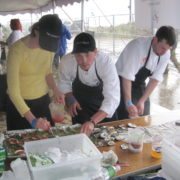Observe / Analyze
Chapter posts
- Boston Beverage Bureaucracy and the Morass of Massachusetts Alcohol Regulations (12/28/2017)
- Thanksgiving 2010 (11/24/2010)
- Water Experiment (02/5/2010)
September 2, 2007 in Boston was one of those days I refer to as one of my ‘top 20’ days of the year. To qualify for my ‘top 20’ list, the day has to be an anomaly, when the weather is so nice you feel like you’re getting away with something. It was a gorgeous Sunday morning, and there was an energy in the city because Clay Bucholz, the rookie Red Sox pitcher, had just thrown a no-hitter the night before. After finishing breakfast and reading my paper, I stopped into The Butcher Shop, one of my favorite restaurants in the neighborhood, to say hello to some friends who worked there. It was about 10am and the staff was setting up for brunch that started at 11. They gave me a piece of warm cornbread with bacon cooked into the batter and we proceeded to catch up on Saturday night’s exploits. Restaurant people are real. Yeah, they can be rough and raw, but that’s what I love about them. Most of them are just working hard trying to make an honest buck to get by. A lot of them are salty, and they tell it like it is, down and dirty. If you’re thin-skinned, you’d be horrified at how they talk before the doors open, behind the scenes, and after they close. Restaurant industry banter is no place for the meek. On this particular morning the mood was light, the camaraderie was strong, and the stories were racy. The topics ranged from the Sox’ rookie sensation, to a new place that opened across the street, to who got drunk, lucky, or both, the night before. The mood changed abruptly when the door opened, signaling that the workday had officially begun. The first customer of the day slowly wandered in and lingered near the front door. As he was reading the menu in the window, ‘Norm’, a feisty new chef, came up to me and whispered, I like it so much better before the customers get here… Although they’re in a minority, the bad customers are the reason that workers feel that way. The bad customers are the ones who hauntingly linger in their minds for days, months and years. They can absolutely ruin a server’s day. As my friend from high school, Kevin, who is still bartending after more than 20 years, wrote: I think that most people are good, and the good far outweigh the bad, but unfortunately the bad are more memorable.
In the Spring of 2007 I was visiting a friend in Manhattan and staying at the Parker Meridien hotel, home of Norma’s Restaurant, considered by some as, Manhattan’s best breakfast. After a world-class breakfast, including fresh-squeezed orange juice and the best blueberry pancake I’ve ever tasted, I set out to plan my day. As I approached the concierge desk, I watched the two gentlemen behind the counter serving the demanding crowd with tremendous patience. If you ever need to kill some time, or are just curious, take some time to watch how people interact with servers when they don’t think anyone else can see or hear them. Linger in the grocery store, at the farmers’ market, or anywhere after you pay and observe how other customers interact with the servers and each other. When you’re waiting for your order in the pizza shop, watch and listen to how customers address the workers when it’s their turn to order. It’s pretty entertaining, amazing, and quite frankly, a little frightening to watch behavior that a lot of people think is acceptable.
I watched as several guests approached the concierge desk, shouting questions with no greeting, cutting and interrupting other guests with, I just have a quick question, as if the person in the front of the line, being served, didn’t matter. When there was a little break in the action, I approached the more animated and aggressive of the two Concierges, Good morning, how are you today? After we exchanged pleasantries and he checked on Sox-Yankees tickets, I told him I’d been watching him deal with the masses and offered, People can be brutal, huh? If you ever want to get anyone who works with customers going, that statement always elicits a spirited response. Or these work equally as well: How’s the stress level today?, People are unbelievable, aren’t they?, and How’s the idiot factor? Usually the response is, Don’t even get me started! After sharing a few war stories with me, the concierge echoed my sentiments: My job would be great if everyone was more patient and thoughtful. Amen…
Beth, a server of 15+ years, sums it up beautifully when asked why some people treat people in the service industries poorly: … Maybe they just don’t think about the actual people who are waiting on them. The single Mom with a sick child at home, the wife whose husband just left her… Here is a partial list of responses from survey participants when asked what words they would use to describe the types of customers that they disliked the most: Pushy, impatient, mean, grumpy, solipsistic, inconsiderate, patronizing, smarmy, demanding, self-important, loud, overbearing, painful, abrasive, cold, pompous, manipulative, pricks, show-offs, abusive, callous, sycophants, unreasonable, conceited, indecisive, demeaning, pretentious, unfair, unforgiving, arrogant, rude, unreasonable, angry, clueless, elitist, total douche bags, miserable, snarky, socially inept, assholes, just plain assholes, and as one friend mentioned, …and a lot of other words not fit to print!!
What’s interesting to me is that no rational, reasonable, responsible, intelligent person would ever want to be described in these terms, yet so many people fit the description. I challenge anyone who thinks they might be part of the 5% factor to ask their friends and relatives if these adjectives ever describe you, or how other people would describe you. If they do, then you are the type of customer that servers, and most fellow human beings, loathe. What you do, in terms of changing of your behavior is up to you.
Suggestion #1: Be conscientiously aware of the world and the people around you. Pay close attention to the detail. Vigilantly watch what’s going on all around you, and take it all in. It’s not all about you. Observe the interactions between customers and servers before it’s your turn, and then show a little empathy, respond accordingly, and make the server’s life a little easier. You can learn so much when you’re waiting, watching and actively engaged in the world and people around you. Raise your level of personal awareness outside of your own bubble and needs. Think about what it would be like to be in the server’s position, or another human being’s circumstance, and then take the time to say and do the right thing when it’s your turn. It’s not that hard.


